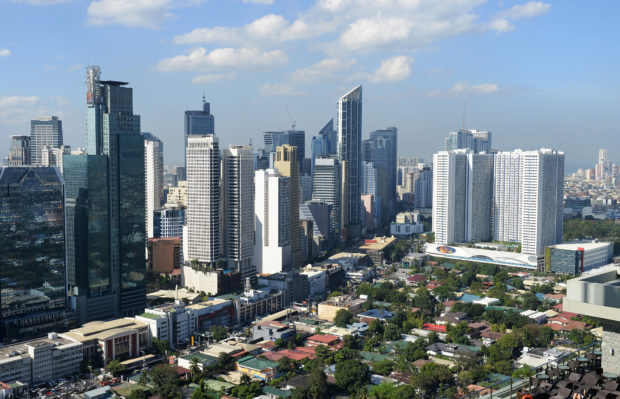
File photo: This photo taken on January 29, 2019 shows a general view of the skyline of the financial district of Makati in Manila. (Photo by Ted ALJIBE / AFP)
MANILA -The Philippine economy may grow in 2023 at a slightly slower pace than earlier forecast, now 5.6 percent from the 5.7 percent expected in March, as high interest rates may ease pent-up demand for goods and services, according to the OECD Development Center.
In an update of their economic outlook for Southeast Asia, China and India for 2023, the Japan-based think tank noted that such a dampening effect had been observed in the Philippines during the first quarter.
“Strong pent-up demand propelled economic expansion in the first quarter of 2023, though the impact was limited by higher inflation and massive borrowing costs owing to aggressive monetary tightening by the central bank,” the report said, referring to the Bangko Sentral ng Pilipinas (BSP).
“These factors dragged down private consumption and investments in the following months, which led to a weakening of the economy in the second quarter,” it added. “This was further exacerbated by the contraction in government spending resulting in real GDP (gross domestic product) growth of 4.3 percent in the second quarter, the lowest in nearly 12 years.”
For the second semester, OECD Development Center sees government spending to be a key driver of Philippine GDP growth, as they expect a strong rebound—from a 7.1-percent contraction in the second quarter—through catch-up plans and frontloading of programs and projects.
Core inflation
Also, the research group noted that while headline inflation continued to decelerate as of July, core inflation remains elevated though it is moderating slightly. The latter metric excludes items such as food and energy, whose prices are volatile or change more quickly than those of other commodity groups.
Moreover, OECD Development Center said inflation in the Philippines continued to face upward pressure, such as the looming threat that El Niño will impact agriculture output, wage increases in the urban sector and the lingering restrictive policy stance of the US Federal Reserve and the European Central Bank.
“The Philippine central bank is likely to maintain a high interest rate regime, which will dampen GDP growth should pent-up demand ease,” it added.
The BSP expects that the monthly headline inflation readout would show an uptick to around 5.2 percent, ending a six-month downtrend from 8.7 percent in January to 4.7 percent in July. INQ